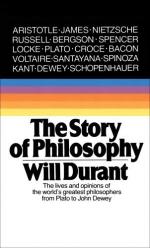
|
| Name: _________________________ | Period: ___________________ |
This test consists of 15 multiple choice questions and 5 short answer questions.
Multiple Choice Questions
1. How does the German Bismarck eliminate Europe's delusions, democracy, and ideals?
(a) recognizing that nations do not share altruism
(b) recognizing that nations now aid one another
(c) recognizing that nations have different philosophies
(d) recognizing that nations are not autonimous.
2. What are the two contrary valuations of human behavior, according to Nietzsche?
(a) the moralist and the scientist
(b) the good and the bad
(c) the master and the herd
(d) the high and the mighty
3. Whose mission is it to save religion from reason and science from skepticism?
(a) Rousseau's
(b) Voltaire's
(c) Kant's
(d) Berkeley's
4. Why does Nietzsche claim that morality and theology must be reconstructed?
(a) to upgrade the language
(b) to make it more appealing
(c) to fit the growth of evolutionary theory
(d) to give it more importance
5. What does Bergson uphold that is distinct from the organism, but is limited by its characteristics?
(a) hearing
(b) eyesight
(c) consciousness
(d) pain
6. What causes Bergson to become a famous popular philosopher?
(a) his world travels and lectures
(b) his winning the Nobel Prize
(c) his work, Creative Evolution
(d) his denouncement of Darwin
7. What, according to Schopenhauer, is the only way to convince someone?
(a) appealing to reason
(b) applying force
(c) applying philosophy
(d) appealing to self-interest
8. How does Schopenhauer describe his situation?
(a) a rider without a horse
(b) a rifle without a bullet
(c) an artist painting for the blind
(d) a musician playing to a deaf audience
9. Who suggests that whenever philosophy grows in a country its moral health decays?
(a) Kant
(b) Berkeley
(c) Rousseau
(d) Voltaire
10. What purpose of Buddhism does Schopenhauer say is superior to Christianity?
(a) destruction of the will
(b) hours of meditation
(c) spiritual revelation
(d) ease of joining the religion
11. Without what does Kant say sensations cannot become perceptions?
(a) action and reaction
(b) space and time
(c) hot and cold
(d) time and energy
12. Where does Schopenhauer go to write a doctoral dissertation in philosophy?
(a) the library
(b) the university
(c) the monastery
(d) the country
13. What does Nietzsche do that gets him discharged from the military?
(a) challenges the commander
(b) takes unofficial leave
(c) disobeys an order
(d) falls off a horse
14. What does Spencer label as the art of methodical self-confusion?
(a) metaphysics
(b) psychology
(c) frenology
(d) scientology
15. What does Bertram Russell's Mysticism and Logic refute?
(a) socialism as a cause of disease
(b) epistemology
(c) mathematics for its rigid impersonality and objectivity
(d) the illogical nature of mysticism
Short Answer Questions
1. What does Russell conclude is too big for his mathematical formulas?
2. What is Schopenhauer's masterpiece?
3. Who is the dominant philosophical thinker of the 19th Century?
4. What is the distinction of his book, The Birth of Tragedy out of the Spirit of Music?
5. How does Schopenhauer develop his blunt manner, realistic mind, and knowledge of the world and of men?
|
This section contains 489 words (approx. 2 pages at 300 words per page) |

|




